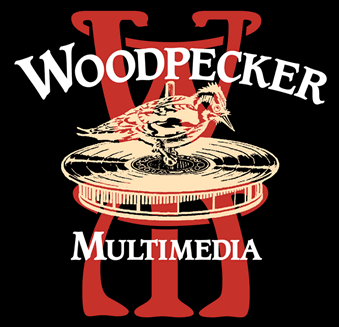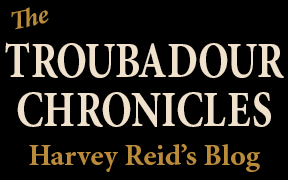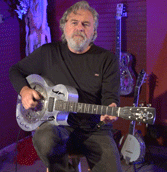 H
H 


|
|
This is part of an authorized online posting of Harvey Reid's important book, "The Troubadour Chronicles," published in May 2020. The book is available in paperback only from this web site, or from Amazon & Kindle books.
Affectionately and respectfully dedicated to all the Troubadours past, present and future, to those who have listened and enjoyed the music made by individuals, and especially to all of you who never really thought much about any of this. Harvey Reid [York Village, Maine, May 2020)] PrefaceI tell this story from my personal perspective, though if I am lucky it will resonate with others who feel similarly but are less inclined to speak out. If I am really lucky, people will forgive me my errors, omissions and transgressions, and even improve and expand on what I have started. I will hope for that, and implore you to be understanding as I embark on this ambitious journey, peer at the music of all humanity through my little troubadour telescope, point and poke at things, and hurl my pebbles that feel like huge catapult balls at the fortresses of accepted knowledge, established scholarship and popular conception. An innocent quest to understand myself has mushroomed into an ambitious narrative that threatens to overwhelm its perimeters, though chasing after all the connecting threads has been the most fun part. Anything I see or say is unavoidably a reaction to the musical and cultural fish tank I inhabit, though my work has been greatly enabled by the tidal wave of information washing over everything in the 21st century. The relentless digital forces that have been making music so accessible to everyone have also swept away big parts of my income and my way of life, though they now allow anyone to explore incredible numbers of recordings and performances and to gorge on information about the music, its history and cast of characters. Ultimately, I am deeply grateful for the opportunity to sit in a small room in a large old house in Maine, traveling through time and space in the information pipelines in search of an understanding of which star and solar system I inhabit in my musical galaxy. I want to tell my tale, share my observations, plant some ideas in your head, but maybe more than anything bring forth an armload of questions. I complain a good deal about the myopia of the “educated white men,” especially in earlier centuries, who felt the need to explain everything in their tedious writing, and I cross my fingers that what I am doing here is not just more of that. By waiting until I was in my 60s to begin this, perhaps my zealotry has been tempered with some wisdom. I traveled extensively for nearly four decades, playing hundreds of concerts every year and selling recordings by the tens of thousands, not millions. It was “un-pop” music, and I worked hard, like a fisherman trying to beat the tides or a farmer getting the harvest in before the storm. Until recently I never really had the luxury of reflecting on the bigger picture of where I was, how I got there, and what all the various levers and gears were connected to. I flew at tree level, under the music business radar, beneath a non-warm and non-fuzzy music industry that was built on a regimen of mandatory fame-seeking and relentless commerce that I was never much attracted to. Now in the twilight of my modest music career I am drawn to do the thing that travelers sometimes do when they clear the path and remove obstacles for those who might follow later. I swear I didn’t set out to be this person. I loved pop music, I gobbled McDonald’s hamburgers and watched Bonanza and Batman as a kid, but something, or perhaps the lack of something, pulled me steadily away from mainstream culture. My appreciation of the music I am drawn to is not something I feel like I can control, and there has never been much of a sense that I was steering anything. I tried to walk down the street, but arms kept grabbing me and pulling me into the alleys. Since I am “just a musician,” it feels acceptable to embrace slightly crazy ideas, so I sometimes entertain the thought that I might have had a previous life, destiny or predetermined path. I never found a satisfactory explanation for why I have been obsessively drawn to music since a young age, without any of the usual triggers or cultural ingredients. Everyone must wonder if they have led other lives, and most of us probably have at least occasional fleeting feelings of that. DNA is getting a little creepy as it tells us about our origins and our connections to others, but I have not yet heard if anyone is suggesting that part of that mysterious non-coding “junk DNA,” which makes up something like 98% of the double-helix molecule, might be linked to what music our ancestors made or liked. It’s not foolish to imagine that we could inherit built-in attractions or abilities involving certain sounds or rhythms. Not all of us create, perform or listen to the same music or share the same tastes, and there are no absolute musical standards, just as in the world of food where we can like and dislike different things without feeling guilty. Every observation depends on the observer, and we have nothing like the Fujita scale for measuring tornadoes or the Richter scale for earthquakes. Classical music isn’t better or worse than blues music. The piano is not better or worse than the violin. Written music is not necessarily better or worse than music played by ear. One style or one musical instrument or brand is not automatically superior or inferior to another; it all depends on the song, who is playing and who is listening. Wildly valuable Stradivarius violins have failed quite a number of blind tests that compared them against other instruments. I have played a super-expensive 1935 herringbone Martin D-35 guitar, a 1952 Telecaster, John Hurt’s Guild, Paul Geremia’s 12-string, Clarence White’s D-28 Martin (Tony Rice has it now), and Eric Schoenberg’s 1930 Martin OM-45 Deluxe– and it is not fair to say that any of them was the best instrument I ever played or heard or would want to always play. I have never been drawn just to music played on particular instruments, in only one style, or from a region or time period. When I hear something musically impressive, I’m focused on the human part– who played it or who created it, not which software platform it was assembled with or which computer-generated drumbeat it uses. I’m also not a Luddite; I use computers and some technology to perform and record my music, but the center of my musical world is that place machines cannot go, where the person digs into the song and they become one with the music. And I certainly don’t like all guitar music or all singing, all blues, or only classic country. What I find the most captivating and soul-stirring is when an individual person sings a song passionately and distinctively, while accompanying themselves skillfully on a musical instrument, without assistance from machines or other humans. When I hear musicians perform alone, I feel like I have the clearest view into their beings and their muses. This activity seems to be both an ancient artifact of our collective human past and an urgent contemporary activity that may take on increasing value as we face a future with our humanity severely challenged as well as assisted by technology. I always wanted to decide what songs or takes go on an album, what order they go in, and even where to put the microphones to capture a sound. I wanted to choose the cover picture, the typeface for the song titles, and never wanted anyone to write liner notes for me to explain my songs. Now as I sit in a different chair, I am struggling to feel confident that I can speak for myself in words the way I learned to with my voice and my instruments. I love the interviews in music magazines; I cherished every sentence on the back of John Fahey and Leo Kottke records; I was impressed that Chuck Berry proudly wrote every word of his sometimes-awkward autobiography, but was repulsed by George Jones’ ghost-written counterpart. I am eternally hungry to hear exactly what musicians have to say, without producers, editors and publicists assisting or interfering, just as we huddle around paintings in galleries to try to feel the life energy in them that was put there by exactly one person. I will conclude here by confessing to perhaps being a flawed revolutionary for feeling apologetic about my assorted proclamations, accusations and demands for more respect for my profession. I have a rather thin skin, and admit to being fearful of whatever blowback could occur as I take aim at institutions and practices not used to criticism or revisionism, especially since I have no backup. I did maintain an impressive head of steam during the three years of thinking, writing and researching that led to this moment, and I am trusting that it represents the true me more so than the reticent one who now writes these final pages in hopes of crossing “Write troubadour book” off my To Do list. It still stings that an editor at Random House changed every sentence in my first book in 1983. So as they say in political campaign ads, “I am Harvey Reid and I approve this message.” I bravely, proudly, foolishly and honestly take ownership of every word and errant quotation mark, every good or bad idea or opinion, and every clumsy or beautiful sentence. I am happy to declare it done, and especially happy for people to read it the way I wrote it. In fact, I dare anyone to actually read it. Harvey Reid I'm trying to raise issues, questions and awareness in the world of modern troubadours... I want people to find this in web searches and to read it. I don't have a way for you to comment here, but I welcome your emails with your reactions. Feel free to cheer me on, or to disagree... Chordally yours, HARVEY REID ©2017
|
